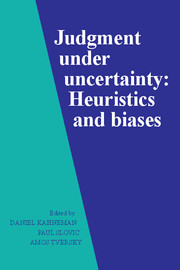Book contents
- Frontmatter
- Contents
- List of contributors
- Preface
- Part I Introduction
- Part II Representativeness
- Part III Causality and attribution
- Part IV Availability
- Part V Covariation and control
- Part VI Overconfidence
- Part VII Multistage evaluation
- Part VIII Corrective procedures
- Part IX Risk perception
- Part X Postscript
- 34 On the study of statistical intuitions
- 35 Variants of uncertainty
- References
- Index
34 - On the study of statistical intuitions
Published online by Cambridge University Press: 05 May 2013
- Frontmatter
- Contents
- List of contributors
- Preface
- Part I Introduction
- Part II Representativeness
- Part III Causality and attribution
- Part IV Availability
- Part V Covariation and control
- Part VI Overconfidence
- Part VII Multistage evaluation
- Part VIII Corrective procedures
- Part IX Risk perception
- Part X Postscript
- 34 On the study of statistical intuitions
- 35 Variants of uncertainty
- References
- Index
Summary
Much of the recent literature on judgment and inductive reasoning has been concerned with errors, biases, and fallacies in a variety of mental tasks (see, e.g., Einhorn & Hogarth, 1981; Hammond, McClelland, & Mumpower, 1980; Nisbett & Ross, 1980; Shweder, 1980; Slovic, Fischhoff, & Lichtenstein, 1977; Tversky & Kahneman, 1974, 1). The emphasis on the study of errors is characteristic of research in human judgment, but it is not unique to this domain: We use illusions to understand the principles of normal perception and we learn about memory by studying forgetting. Errors of reasoning, however, are unique among cognitive failures in two significant respects: They are somewhat embarrassing and they appear avoidable. We are not troubled by our susceptibility to the vertical-horizontal illusion or by our inability to remember a list of more than eight digits. In contrast, errors of reasoning are often disconcerting – either because the solution that we failed to find appears quite obvious in retrospect or because the error that we made remains attractive although we know it to be an error. Many current studies of judgment are concerned with problems that have one or the other of these characteristics.
- Type
- Chapter
- Information
- Judgment under UncertaintyHeuristics and Biases, pp. 493 - 508Publisher: Cambridge University PressPrint publication year: 1982
- 68
- Cited by

